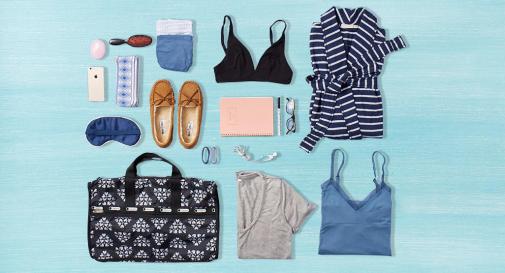Have everything ready to go when you’re 8 months pregnant, since you could go into labor at any time in the weeks before your due date. You may want to pack two small bags for the hospital or birth center: one for the items you’ll need during labor, and another for items that you won’t need until after you give birth. (See what to pack for a scheduled c-section.)
Here’s what experienced moms recommend packing:
What to pack for labor
- A picture ID (driver’s license or other ID), your insurance card, and any hospital paperwork you need
- Your birth plan, if you have one
- Eyeglasses, if you wear them. Even if you usually wear contact lenses, you may not want to deal with them while you’re in the hospital.
- A bathrobe, a nightgown or two, slippers, and socks. Hospitals provide gowns and socks for you to use during labor and afterward, but some women prefer to wear their own. Choose a loose, comfortable gown that you don’t mind getting dirty. It should be either sleeveless or have short, loose sleeves so your blood pressure can be checked easily. Slippers and a robe may come in handy if you want to walk the halls during labor.
- Whatever will help you relax. Here are some possibilities: your own pillow (use a patterned or colorful pillowcase so it doesn’t get mixed up with the hospital pillows), music and something to play it on, a picture of someone or something you love, anything else you find reassuring. If you’re going to be induced, think about bringing something to read or watch because it may be a while before labor is underway.
What to pack for your partner/labor coach
- A camera or video camera with batteries, charger, and memory card. Someone has to document the big event! Some hospitals don’t allow videotaping of the birth itself, but there’s usually no rule against filming during labor or after the birth. If you plan on using your phone to take photos or video, make sure it’s fully charged and pack your charger. Note: Not all hospitals let you use plugs in the delivery room, so you might want to bring a battery-powered charger or another way to charge your devices that doesn’t require a plug.
- Toiletries
- Comfortable shoes and a few changes of comfortable clothes
- Snacks and something to read or watch
- Money (or a credit card) for parking and change for vending machines
- A bathing suit. If you want to take a bath or shower during labor, you may want your partner to get in with you to support you or rub your back.
What to pack for after you deliver
- A fresh nightgown, if you prefer to wear your own
- Your cell phone and charger or, if you’ll be using the hospital phone, a prepaid phone card. After your baby’s born, you or your partner may want to call family and friends to let them know the good news. Bring a list of everyone you’ll want to contact so you don’t forget someone important when you’re exhausted after delivery.
- Snacks! After many hours of labor, you’re likely to be pretty hungry, and you may not want to rely solely on hospital food. So bring your own – crackers, fresh or dried fruit, nuts, granola bars, or whatever you think you’ll enjoy. A bottle of nonalcoholic champagne might be fun for celebrating, too.
- Toiletries: Pack a few personal items, such as a toothbrush and toothpaste, lip balm, deodorant, a brush and comb, makeup, and a hair band or barrettes. Hospitals usually provide soap, shampoo, and lotion, but you might prefer your own.
- Comfortable nursing bras or regular bras. Whether or not you choose to breastfeed , your breasts are likely to be tender and swollen when your milk comes in, which can happen anytime during the first several days after delivery. A good bra can provide some comfort, and breast pads can be added to help absorb leaks.
- Several pairs of maternity underpants. Some women love the mesh underwear usually provided by the hospital, but others don’t. You can’t go wrong with your own roomy cotton underpants. The hospital will provide sanitary pads because you’ll bleed after delivery. Make sure you have a supply of heavy-duty pads waiting at home!
- A book on newborn care. The hospital will probably provide you with a book, but you may prefer your own. Of course, the postpartum nurses will be there to answer questions and show you how to change, hold, nurse, and bathe your newborn if you need guidance.
- Photos of your other children. When they come to visit, they’ll see that you haven’t forgotten them.
- Gifts for older siblings. Some parents bring gifts for the new baby to “give” to big brothers and sisters.
- A notepad or journal and pen or pencil. Track your baby’s feeding sessions, write down questions you have for the nurse, note what the pediatrician tells you, jot down memories of your baby’s first day, and so on. Some people bring a baby book so they can record the birth details right away.
- A going-home outfit. Bring something roomy and easy to get into (believe it or not, you’ll probably still look 5 or 6 months pregnant) and a pair of flat, comfortable shoes.

